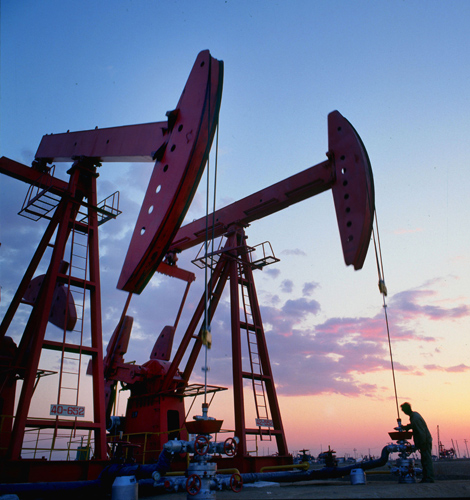PetroChina Q2 profit falls below estimates
Updated: 2011-08-27 10:04
By Chua Baizhen and Guo Aibing (China Daily)
|
|||||||||||
|
 |
|
A PetroChina Co oilfield in Liaohe, Liaoning province. The company has set a target of processing 8.4 percent more crude into fuels this year. [Photo / China Daily] |
The oil company says controls on fuel prices caused the shortfall
BEIJING - PetroChina Co, Asia's biggest company by market value, urged the Chinese government to allow oil companies to earn "reasonable" margins after second-quarter profit missed estimates because of controls on fuel prices.
Net income fell 12 percent to 29 billion yuan ($4.5 billion) from a year earlier, according to calculations based on half-year earnings reported by the energy explorer and refiner on Thursday. PetroChina suffered losses on oil processing, eroding gains from higher crude prices.
The government's pricing "mechanism should consider the sustainability of oil enterprises", said Zhou Jiping, president of the Beijing-based company, at a media briefing in Hong Kong.
"It should provide a reasonable profit margin."
Earnings may improve as oil's retreat from the highest price in more than two years eases inflationary pressures in the fastest-growing major economy, allowing the government to raise gasoline and diesel prices. PetroChina is also set to benefit from a tax rebate on natural-gas imports to help meet demand for the fuel.
"The second half will be a lot better," said Gordon Kwan, the Hong Kong-based head of regional energy research at Mirae Asset Securities Ltd. "Inflation is peaking in China and the government will increase domestic gasoline and diesel prices. There's also the tax rebate on gas imports."
The second-quarter profit was less than the 30.3 billion-yuan median estimate in a survey of six analysts. PetroChina didn't give a quarterly figure. The company's spokesman Mao Zefeng confirmed the calculation by Bloomberg News.
PetroChina has declined 8.1 percent in Hong Kong trading this year, compared with the 14 percent drop in the benchmark Hang Seng index.
Net income in the first six months rose 1 percent to 66 billion yuan, missing analysts' estimates. PetroChina's refining business swung to a loss of 23.4 billion yuan from a profit of 3 billion yuan a year earlier, as the cost of processing crude into fuels climbed 3.1 percent to 138.75 yuan a ton.
CNOOC Ltd, China's largest offshore energy explorer, boosted first-half net income by 51 percent to a record, partly because oil and gas production accounts for 99 percent of its income and it operates only one major refinery.
Refining and marketing accounted for 12 percent of PetroChina's operating income last year, while exploration and production had a share of 78 percent.
"Impacted by the persistently high international crude oil prices and (with) domestic prices in refined products not having been fully adjusted upward to reflect the changes of international crude oil prices, the refining and chemicals segment incurred a loss," PetroChina said.
China, which controls fuel prices to curb inflation, raised tariffs by about 10 percent in the first half while crude in New York averaged 26 percent higher from a year earlier. Oil rose to a 30-month high of $114.83 a barrel on May 2 and has since declined to about $86.
China's inflation accelerated to the fastest pace in three years in July. Economists expect the rate to ease to 5 percent in the third quarter from 5.7 percent in the second.
The government may adjust fuel prices when crude costs change more than 4 percent over 22 working days. China last raised gasoline and diesel prices by as much as 5.8 percent on April 7.
PetroChina has set a target to process 8.4 percent more crude into fuels this year, according to presentation slides viewed by Bloomberg at the media briefing.
The company is also aiming to boost crude output by 3.3 percent to 885.8 million barrels and expand natural gas production by 10 percent, the media the slides showed.
Bloomberg News
Related Stories
PetroChina first-half net profits edge up 1% 2011-08-25 18:38
PetroChina to resume CDU 2011-08-05 17:38
PetroChina's plant on fire in NE China 2011-07-16 16:44
PetroChina eyes progress in Sino-Russian pipeline 2011-05-19 10:21
PetroChina boosts its overseas operations 2011-05-19 07:52
- Profits of China's industrial businesses up 28.3%
- More oil seepage found at Bohai Bay platforms
- Terra Firma lands in China
- Troubled US firms see Chinese opportunities
- Surging economy boosting airlines
- PetroChina Q2 profit falls below estimates
- Markets set to rise: CICC chairman
- China to review foreign M&A













